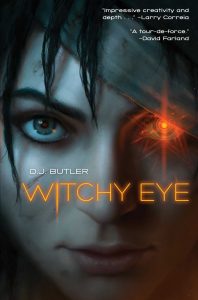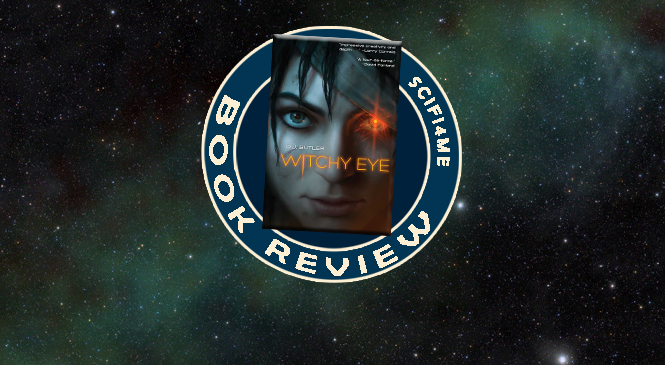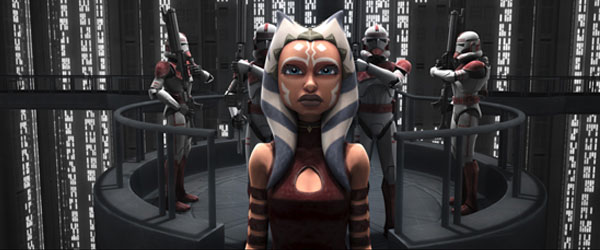Review: I Wish My History Books Had A WITCHY EYE

 Witchy Eye
Witchy Eye
Written by D.J. Butler
Published by Baen
March 7, 2017
Paperback, 561 pages
If only my history books were this interesting….
Just when I thought I had some type of grasp on the history of the United States, I received D.J. Butlers’s first novel of the Witchy War series, Witchy Eye. Life is fairly normal for Sarah Calhoun, a fifteen-year-old with a bad eye and a talent for hexing, until a Yankee wizard priest tries to kidnap her. With the help of a mysterious monk, she fights back and learns about a heritage that makes her the target of the Emperor and the dark creatures that work for him — or is the Emperor just their pawn? Sarah sets out on a journey to lay claim to the kingdom and wage a war against the Emperor of the New World.
Oh, did I mention that this is set in an alternate history for America? Yup. Sarah is from Appalachee, more specifically the area around Nashville. Her party travels to New Orleans, through the Memphis area, up the Mississippi to the Ohio river. They speak of Andrew Calhoun, Andrew Jackson, Oliver Cromwell, Benjamin Franklin, and William Penn. But these aren’t the men you know and they aren’t heroes from my school classes. They’re interesting, but Butler has put a nice twist on them in the book. The worldbuilding is so well done and tightly written that any name mentioned makes you wonder: is that just a character or a character of a real person?
I want to start here first. The worldbuilding is amazing. At the beginning of the book, Butler speaks of the inspiration to write a novel like this, mixing settings and elements of stories he likes like a kid at a soda machine making a Hurricane (every soda all into one drink). But unlike that mysterious unknown taste you’d get (and hope you’ll like), he weaves historical figures, magic, and demons into real places and events the reader can relate to while having enough of a warping that makes the reader question every name, society, or religious reference. The importance of religion in the story was fascinating. I guess it helps that I was also reading the Old Testament at the same time, so there were comments made I could say, “I get that!” But I love how it’s as much a character as the people and creatures. I’m not just talking about the bishop or the monk or preachers. The characters we follow are bound by their faith and it’s shown through their actions and their thinking: Undo the fall of Adam and become a second Christ, a better Savior, yet can that character still serve God after serving the Necromancer?
That’s an interesting relationship.
Speaking of relationships, the stranger-to-companion-to-family path Butler builds with each characters is a slow but well-timed burn. Much like the submersion into a completely different reality that makes the reader question their own knowledge, Butler draws together the most unlikely groups of characters, carefully developing them and their bonds in such a way that’s believable and makes you care about them. He taps into the human mind that can trick a person into questioning good intentions and the conflicts that do exist when deciding how far the relationship with this stranger will go. It makes those friendships — or rivalries — more dangerous because you care what happens after going through the internal struggles.
The main characters, Sarah and Calvin, are young, in their mid- to late teens, yet they don’t behave this way. There’s usually a point in stories with teen leads where their teenage thinking, talking, and actions make me just want to slap them. (That’s me being nice.) However, given the period when this story takes place, kids had to grow up fast and do adult stuff. So while there are hormones, these teens aren’t annoying like the glittery vampires are. This allows the seriousness of the story to be real and have an impact. We get believable struggles that make the reader invest into the story being told.
In Butler’s preface, he says his friend Michael Dalzen, who was in his writing group, told Butler to write the story he wants to write, not to make it YA but for grownups. Don’t worry about losing readers, pull no punches, do exactly what he wants to see. Butler says it was great advice and he took it.
Michael Dalzen, thank you.
There are more things I could go on about, but I can’t seem to always complete my thoughts because they flow into something else, one into the other into the other. Ask Mr. Boss how many conversations about the book have been left just hanging. I will admit that I had some fear that the heavy worldbuilding would take my American history and warp it so that it would be too much for my mind to wrap around. But I hung in and took my time so I wouldn’t be overwhelmed and put the book down occasionally, as I have with others. Now I’m curious to see if the density of those others would be easier now.
I have thoroughly enjoyed the submersion into this alternative reality, so much so that I started the process to get the next book so as soon as I finished this review I could immediately start book 2, Witchy Winter, which is currently sitting next to me. (My rule is to not pick up another book until the review is submitted. I finished this book yesterday.) I’m anxiously waiting to send this off so I have a good excuse to go to bed early and continue my journey with Sarah and her crew.
PS: Two thank you’s: First to D.J. Butler for my two packages that we unboxed live and the teaser statements that have had my mind turning on possibilities. Second to Toni Weisskopf at Baen for listening to the mixed ramble of what I like to read and picking this book. You chose wisely.
![]()


